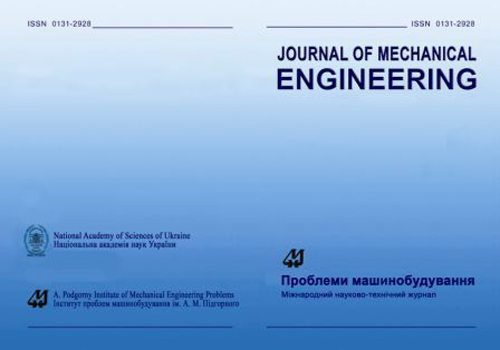Institute of Mechanical Engineering Problems of the National Academy of Sciences of Ukraine
Institute of Mechanical Engineering Problems of the National Academy of Sciences of Ukraine (Інститут проблем машинобудування імені А.М. Підгорного НАНУ; Instytut problem mashynobuduvannia imeni A.M. Pidhornoho NANU). A technological scientific research institute at the National Academy of Sciences of Ukraine. It was established in Kharkiv in 1972 to replace a branch of the Institute of Technical Thermophysics of the Academy of Sciences of the Ukrainian SSR. The Institute of Mechanical Engineering Problems (IPMash) became one of the largest research and technological complexes in Ukraine and the main center of fundamental and applied research in the field of energetics and mechanical engineering. Aside from the institute, the complex also included a special technological-design bureau and a developmental production center. Its priority research areas included the search for alternative energy technologies, in the 1970s; the extension of service of the working power-generating units and the prognostication of their residual life, in the 1980s; and the issues of energy independence and sustainable development of energy infrastructure of independent Ukraine, in the 1990s.
Among the institute’s most important achievements was the development of a series of steam turbines for thermal power stations in the 1970s, including the turbines with the capacity of 300 megawatts, and later a series of slow-speed turbines for nuclear power stations, with the capacity of 500, 750, and 1,000 megawatts. A meteorological department was opened at the institute in 1972. A laboratory of circulating hydraulic machines was added in 1978. Its scientists created the cutting-edge models of hydro-turbines and circulating hydro-machines to be used in the production of hydropower units for hydroelectric power stations and hydroelectric pumped-storage power plants across Ukraine and abroad. Among the laboratory’s designs was also a turbine-pump with the highest unit capacity in Europe that was installed in the Dnister River Pumped Storage Power Station. The institute’s founder Anatolii Pidhorny pioneered the study of hydrogen energy and promoted the creation of heat pump systems. Heorhii Sokolovsky and Vitalii Gnesin developed mathematical models for the study of three-dimensional flow of liquid and gas in turbomachines and compressors. This permitted the next generation of scientists in the mid-1990s (Serhii Yershov and Andrii Rusanov) to create the FlowER software package for the computation of three-dimensional frictional flows in air-gas channels of turbomachines used by a number of mechanical energy engineering plants.
Several of the institute’s research teams were awarded the State Prize of the Ukrainian RSR (after 1991 independent Ukraine) in Science and Technology—the highest award given by the Government of Ukraine for accomplishments in science and technology: in 1980 (for the project titled ‘The creation, development, and economic implementation of the theory of R-functions’), in 1984 (for the cycle of works on the power of energy machines in turbine-building), and in 2008 (for the project titled ‘The improvement of power-efficiency in the work of turbo-installations in hydroelectric power stations and hydroelectric pumped-storage power plants’).
At its peak in the mid-1980s, IPMash had 4 sectors (energy machines; engines and long-term energy sources; power and safety; and mathematical and physical modeling), 16 research departments, and 585 staff (excluding those employed in the design bureau and production center). In 1996, the institute was named after its founder and first director Anatolii Pidhorny. In 2000, it was reorganized as the research and technological concern ‘Institute of Mechanical Engineering Problems of the National Academy of Sciences of Ukraine’ (IPMash NANU). In 2019, the special technological-design bureau was abolished. In 2021, IPMash incorporated the Institute of Technical Problems of Magnetism of the National Academy of Sciences of Ukraine. IPMash collaborates with Kharkiv’s two leading universities: Kharkiv National University (with which it co-chairs the Faculty of Physics and Energetics) and Kharkiv Polytechnical Institute National Technical University (in which it co-founded the Department of Fluid Mechanics and Heat-Mass Exchange). It has 10 research departments (reliability and dynamic strength; vibration and thermostability studies; optimization of processes and designs of turbomachines; hydroaeromechanics of power machines; general engineering studies in power engineering; magnetism of technical objects; hydrogen energy; non-traditional energy technologies; mathematical modeling and optimal design; and modeling and identification of thermal processes in energy technology equipment), the laboratory of magnetic metering, the center for the collective use of research equipment, developmental production center, and a computer center. Its staff (251 in 2022) includes two academicians of the National Academy of Sciences of Ukraine (Andrii Rusanov and Yurii Matsevyty) and six corresponding members of the NANU (Andrii Kostikov, Oleh Kravchenko, Volodymyr Rozov, Yurii Stoian, Anatolii Tarelin, and Oleksandr Shubenko). Its scientists conduct research in the fields of mechanical engineering, solid-state and fluid mechanics, applied and theoretical mathematics and computer science, hydroelectric and nuclear energy, machine reliability, internal-combustion machines, and various aspects of machine building. Over the years, several world-renowned scientific schools developed in IPMash: hydromechanics and the profiling of blade machines (Heorhii Proskura, Dmytro Aleksopolsky, Serhii Yershov, Andrii Korotkov, Yosyp Leites); mechanical engineers specializing in computation methods of machine-building constructions (Anatolii Filippov, V. Bulhakov, V. Hontkevych, Borys Kantor, V. Mitkevych); optimization of processes and elements of designs of turbine machines for power stations on nuclear and organic fuels with the help of mathematical and physical modeling (Leonid Shubenko-Shubin, Yurii Dedusenko, Anatolii Palahin, Dmytro Pereverziev, Anatolii Tarelin, and Oleksandr Shubenko); mathematical modeling of physical processes (Volodymyr Rvachov); non-traditional energetics, including the hydrogen one (Anatolii Pidhorny); thermophysics, particularly the study of nonlinear and inverse heat conduction problems (Yurii Matsevyty); and optimal geometrical design (Yurii Stoian). IPMash is part of the Department of Physical and Technical Problems of Power Engineering of the National Academy of Sciences of Ukraine. IPMash publishes the Problemy mashynobuduvannia / Journal of Mechanical Engineering (40 vols, 1975–94; 25 vols, 1998–). Its directors have been Anatolii Pidhorny (1972–96), Yurii Matsevyty (1996–2016), and Andrii Rusanov (2017–).
BIBLIOGRAPHY
The institute’s official website: https://ipmach.kharkov.ua/
Serhiy Bilenky
[This article was updated in 2022.]

